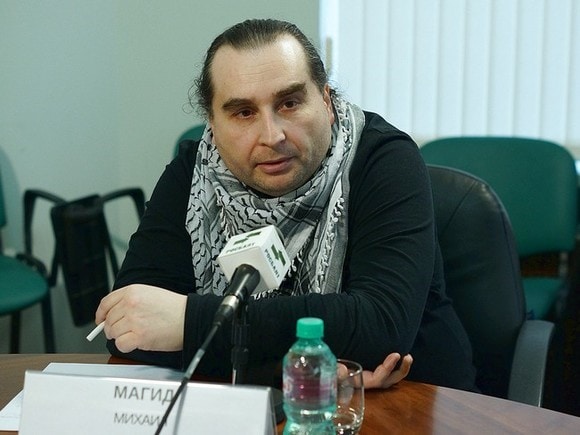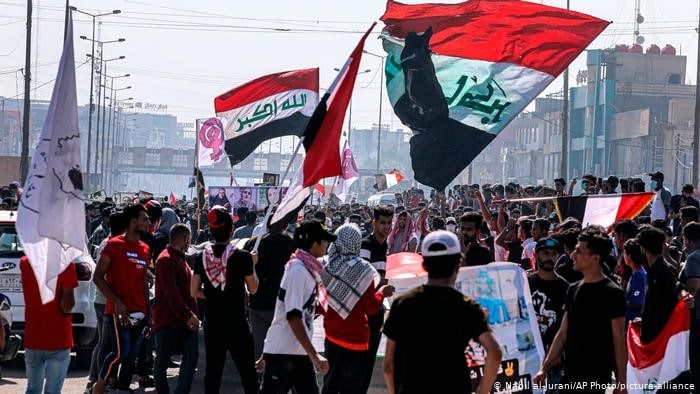A Rosbalt article, featuring an interview with the Russian Middle East expert Mikhail Magid and titled "Things Are Heading Towards 'Arab Spring 2.0', argues that while the world is focused on the turbulence in the United States and the fight against Covid-19, the Middle East is headed towards another blowup. The blowup will be caused by class conflict rather than religious or national differences. A paradox has been created, the Iranians have outplayed the United States politically, but the corrupt system that they have installed in Iraq creates economic desperation that will find an outlet in violent protest and even in nostalgia for Saddam Hussein.
The article by Rosbalt's observer Alexander Zhelenin including his interview with Magid follows below:[1]

Mikhail Magid (Source: Rosbalt.ru)
"The turbulent events in the United States and the ongoing pandemic in the world now occupy nearly the entire global information agenda. However, events no less important than before continue to take place in the Middle East. The social tension that periodically spills over to the streets of Iraqi cities is not decreasing. The other day, the police in the Iraqi city of Al-Nasiriyah tried – and not for the first time – to disperse the Shi'ite youth protesting there. But Iraqi army soldiers sided with the protesters and opened fire on the police, killing one of them.
"The class conflicts in Iraq are superimposed on the fact that today this country has come under neighboring Iran's enormous influence. Meanwhile, United States influence in Iraq is still perceived, although not to the previous extent.
"Mikhail Magid, an expert on the Middle East, told Rosbalt's 'observer' about the social processes now taking place in Iraq and other countries of the 'Shi'ite belt', as well as about the influence of major regional and world powers on these countries."
"What are the Iraqi protests?"
"In autumn 2019 - winter 2020, a gigantic protest wave of unemployed youth, the poor, workers and other strata covered Iran and the entire zone of Iranian influence (the 'Shi'ite belt'), including Iraq, as well as Syria and Lebanon. The movement transcended the borders of a single country and some participants realized this, in Beirut they sang: 'From Tehran to Beirut - one revolution!'
"Protest participants demanded work, lower prices and the provision of basic social services (clean water, electricity, medicine). Youth unemployment in the region's countries totals 40%, social services function poorly due to the same corruption.
"This protest movement, which could be called "Arab Spring 2.0.", was leaderless and coordinated through social media. It weakened due to the pandemic and was partially suppressed by the security forces. About a thousand protesters were killed, and more than 20 thousand people were injured.
"As illustrated by Iraq, we currently see that the distress and protest moods have not vanished and, in the future, a continuation of these protests most likely awaits us. The movement put forward justified social demands and, in this regard, it makes more sense than the 'Arab Spring', whose participants protested against dictatorships, but did not know what they wanted in exchange.
"In Lebanon alone, two million people took part in the 2019–2020 protests, with hundreds of thousands of Shi'ites burning the offices of the pro-Iranian Lebanese group Hezbollah. In Iraq it was the same - the offices of political parties were burnt.
"This is partially, a Shi'ite-Shi'ite class conflict - the Iranians cooperate with the rich influential Shi'ite elite in these countries, but the lower strata of this Muslim community are impoverished and protest. Nevertheless, this is still not a religious or national conflict, but a confrontation between the poor and the rich.
"Although in Iraq and Iran, it was primarily the Shi'ites who participated in the movement, many Sunnis and Christians also joined it. It was attended by local Arabs, Kurds, Palestinians. The victims are not innocent victims at all. These were the supporters of violent revolution, who fell in the struggle. Perhaps in the future we will see autonomous self-government bodies created from below fighting for the rights of the multi-confessional and multi-ethnic poor, or even take power into their own hands."

Demonstrations in Iraq (Source: Dw.com)
"How great is Iran's influence in Iraq?"
"It is dominant today. 65% of the Iraqi population are Shi'ites. Let me remind you that Shi'ite Muslims predominate in Iran. The central parliament and government in Baghdad are currently likewise dominated by Shi'ite parties that control the main departments. Most of the parties are in one way or another connected with the Iranian regime - the Shi'ite theocracy. The army is also run by Shia generals. The main counter-terrorism unit, the Golden Division, is in the hands of Iranian supporters; one of its leaders, Abdel Wahab al Saadi, was fired last year for lack of loyalty to Iran.
"The country has strong pro-Iranian armed groups operating within a coalition called the Popular Mobilization Forces (PNM). When the "Islamic State" (IS, a terrorist organization banned in the Russian Federation) arose in 2014, it identified itself with the Sunnis. Shi'ites were threatened with mass destruction. Iranian troops rescued Baghdad from the IS offensive. With Iran's support, a Shi'ite militia was created in the country, which first stopped and then, together with the "Golden Division", defeated the militants.
"But this gave Iran additional opportunities. And in the past year, amid massive protests in Iraq, the militias have become the main force for suppressing these protests. So now the corrupt state's elite is completely dependent on the pro-Iranian armed groups and Tehran's influence has increased even more.
"The Iranians are masters at political chess games. They influence the state, by relying on many competing parties and law enforcement agencies. A weak fragmented state is incapable of consolidation and is the sum total of racketeers fighting among themselves, imposing extortions on business and 'mastering' state funds."
The US Is A Big Body With A Small Brain, Iran Is A Small Body With A Big Brain
"There is a joke going around in Iraq: 'Why did the US lose Iraq? Because the US is a big body with a small brain, and Iran is a small body with a big brain.' According to the New York Times, the US abandoned its intelligence network as it pulled out of Iraq. The Iranians discovered and bought it, including intelligence generals.
"But the Iranians have a limited understanding of economics. Their model is destroying Iraq. Such a state cannot function, and the economy, besieged by various racketeers, cannot develop. This generates protests and, over time, could destroy Iranian influence."
-"And what is the United States' influence in contemporary Iraq? Or is there nothing left at all and the Americans in this country were completely ousted by the Iranians?"
"American influence also exists here, of course. Iraqi oil is produced by multinational companies associated with the United States. Washington from time to time threatens Iraq with sanctions for economic cooperation with Iran, and the Iraqi regime is obliged to fulfill some of the Americans' demands. Finally, several thousand American troops remain on the territory of Iraq, deployed to fight the remnants of IS. But the bases with the Americans are regularly subjected to rocket attacks by pro-Iranian units. That is, the Americans' influence in Iraq, of course, is still there, but it is not dominant today."
Nostalgia For Saddam Hussein
"How serious is corruption in Iraq? Why do people there constantly protest?"
"Iraq is one of the most corrupt states on the planet. To get a job as a doctor in the public sector in Baghdad, you have to pay 10 thousand dollars, and not everyone, to put it mildly, has that kind of money. Meanwhile, there is more work in the public sector - state-owned companies redistribute oil revenues. Although oil is produced by multinational corporations, the state receives a fixed share.
"Oil exports are the backbone of the economy. Iraq bathes in oil money, but little reaches the population. This generates resentment.
"The security forces alone employ about one million people (the entire population of Iraq is 40 million), but many military units are fictitious: generals take money to provide for non-existent soldiers. The main resources are owned by political parties and security officials through state corporations. The militia is also getting rich. Thus, the Ministry of Internal Affairs is under almost complete control of the pro-Iranian "Badr" detachment. Other militias have set up roadblocks and take money from truckers, impose extortions on businesses, and cover up prostitution.
"The public service agencies do not fulfill their duties - there is not enough medical care, electricity is often switched off, there are problems with clean water. In the southern city of Basra, mass poisonings are frequent due to water pollution. People live in large families in tiny rooms, there is not enough housing. In the summer, in conditions of terrible heat, it is very difficult without air conditioning.
"In the days of Saddam Hussein, young people went to universities or factories, the old people received free flour, oil, rice. Now there is no work, and food aid is worthless rice with insects. Saddam Hussein was a dictator and some call him "the Arab Hitler" because under him millions of Kurds and Shi'ites (Saddam was a Sunni) were purged and killed. But today, many even remember this terrible dictator with warmth, cursing the current regime, and this in itself says a lot about the current government."
[1] Rosbalt.ru, January 16, 2021.








